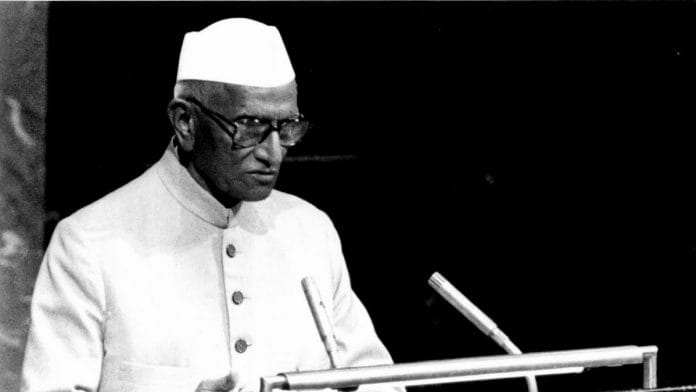Morarji Desai was known as a man of principles – one who stood ramrod straight in the ambit of Indian politics for decades. He was a Gandhian leader who suffered detention stoically both during the freedom struggle and during Indira Gandhi’s Emergency.
Even though the Emergency stay was in a comfortable guest house in Haryana, solitary confinement for 19 months would have been difficult for anyone, let alone a man of 80. But Desai used the period for contemplation, spinning khadi, reading and writing. He even taught his guards Hindi and English (Remembering Things Past: A Salute to Morarji Desai, the Odd Genius of Indian Politics by Ram Jethmalani, Indian Express, 14 May 1995). On 5 April 1976, then-Prime Minister Indira Gandhi sent a message to Desai – he would be released if he signed an undertaking to retire from active politics. Desai showed the emissary the door.
That one action defines Morarji Desai’s life and politics – the man who became India’s oldest prime minister at 81.
Also read: Morarji Desai had stolen PMO documents. Was set to reveal classified secrets
A direct man
Born into a Gujarati family in 1896, Desai became the chief minister of Bombay Presidency, and finance minister for both Jawaharlal Nehru and Indira Gandhi after Independence. In 1977, he became prime minister of the first-ever non-Congress government of the Janata Party.
However, the government did not last long and Desai’s government demitted office within 28 months in July 1979. In this short period, the government was able to bring about a permanent change in the Constitution through the 44th Amendment Act of 1978, which made the declaration of Emergency like Indira had done virtually impossible. Apart from this, the Janata government restored the image of the judiciary and the bureaucracy – both institutions had been devalued and trampled upon – it firmly halted inflation (with the able support of then Finance Minister H.M. Patel) and established good relations with all of India’s neighbours, including Pakistan.
Morarji Desai believed in the cut and thrust of debate as well as the freedom of the fourth estate – the media. He had regular press conferences where journalists were given full freedom to ask questions. Desai did have the habit of answering a question with a counter-question, but this did not hold him back from giving satisfactory answers. Once, when asked why he answered questions with counter-questions, he shot back saying: “Why not?”
At his first press conference as prime minister, he laid out the main objectives of his government – controlling inflation, amending the Constitution to undo the mischief of the 42nd Amendment, and creating an atmosphere of fearlessness in the country. Desai said, “Ask any question and I will not take it ill, but you also do not take it ill when I say something which is not very pleasant.”
Also read: One teaspoon twice a day — Indians opting for ‘urine therapy’ to ‘cure’ cancer, Covid
A true patriot
Many think that Desai was a dry person because of his belief in alcohol prohibition and propagation of auto-urine therapy. But these idiosyncrasies pale into insignificance once you look at Desai’s whole life.
Morarji Desai could be quite curt and blunt with sycophants. Once an acquaintance told him of a deal that Indira Gandhi had supposedly made a deal with a foreign government. He retorted angrily, “I know Indira. Jawaharlalji’s daughter would never do that.” (The Book I Won`t be Writing and Other Essays by H.Y. Sharda Prasad)
Desai made a genuine attempt to bring technocrats into the government at the Secretary level. He brought in Manmohan Singh, economist Lovraj Kumar, and engineer Manuel Menezes. Unfortunately, this policy was later given up.
Desai, despite heading a non-Congress administration, was fairly open in his admiration for Nehru. He said, “Nehru was a true democrat and a worthy inheritor to Gandhi’s mantle….He was a good leader, a patriot. He understood India.” (Interview in The Illustrated Weekly, 2 February 1986).
Desai was free from any communal prejudice and was respected by almost every community. The well-known vocalist, Bade Ghulam Ali Khan, who had migrated to Pakistan found the atmosphere stifling there and wanted to come back to India. Desai, then chief minister of Bombay State, welcomed him back and allotted him a flat in Mumbai.
Morarji Desai will always be remembered as a true patriot, able parliamentarian and above all, one who could put his life at stake to defend communal harmony.
Arvindar Singh is the author of the book Morarji Desai: A Profile in Courage. He tweets @arvindar_singh1. Views are personal.






